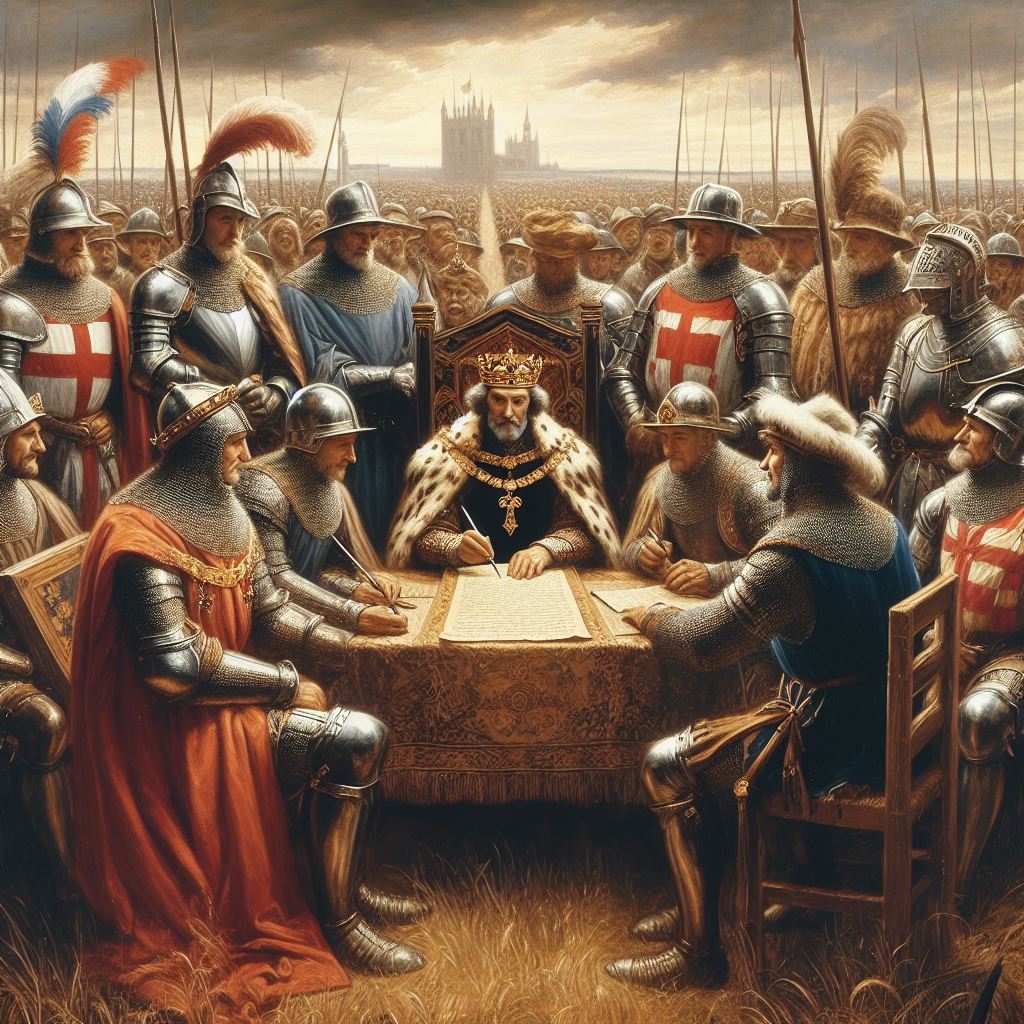Runnymede, near Windsor, England, June 1215
Victor’s mission to witness the historic signing of the Magna Carta on 15 June, 1215, didn’t quite go as planned. He was renowned for his attention to detail, always adhering to the British Army’s ancient principle of the Seven Ps – Prior preparation and planning prevents piss poor performance – which usually guaranteed success. However, on this occasion, time had a different expectation of how much preparation and planning was required, and it had found Victor’s attempt lacking.
He ascertained that time travel introduced a fresh set of challenges, transforming the mundane into the remarkable. It became clear that traversing different eras demanded heightened attention to minute details. Teaming up with Henry, they modified garments acquired from the BBC costume heist. Equipped with ample sketches and descriptions of period attire, they pursued authenticity, aiming for Victor to merge into the throng, undetected and unimpeded.
Victor wanted to secure a strategic vantage point near the King to record the event, but what to wear? Disguising himself as nobility, clergy, or a knight was dismissed; their prominence would attract too much attention. Likewise, assuming the attire of a soldier was ruled out due to familiarity among their ranks. After careful consideration, he decided to adopt the persona of a successful merchant – a guise blending in amid the diverse crowd. Merchants frequented such gatherings, offering him a level of access and entry superior to that of a mere servant or commoner. While he wouldn’t guarantee a front-row view, this strategy would allow him to get close enough for a quality recording.
He donned a knee-length tunic of rich brown, made from loose-fitting wool and cinched at the waist with a cloth belt. Matching leggings in an earthy shade extended just below his knees, adding to the look. Layered on top was a turquoise green woollen cloak, secured by a simple brooch containing his camera. Completing the medieval aesthetic, Victor chose durable leather boots reaching mid-calf and a hood to mask his modern hairstyle. A leather belt around his waist held a pouch filled with coins from the era, perfecting his authentic appearance.
Everything seemed impeccable, and therein lay the problem. Unnoticed by Henry and Victor was a minute yet crucial detail that eluded their scrutiny: subtle machine-stitched seams on his tunic, contradicting the hand-sewn norms of the time. Although, that wasn’t the crux of the matter – the real trouble brewed within his pleasant aroma.
In 1215 England, personal hygiene habits were very different from contemporary standards. Bathing was not as frequent and people often relied on simple washing methods. Soap was not commonly used, and people used a mixture of water and herbs for cleansing. The prevailing belief at the time was that excessive bathing could be detrimental to one’s health, and as a result, people in 1215 England had a distinct odour compared to modern standards. The lack of regular bathing, coupled with the absence of deodorants and perfumes, could contribute to a more pronounced natural aroma.
To those gathered, Victor’s scent would have been quite unusual. That morning, he’d used his go-to 3-in-one apple-scented shower gel all over, giving him the aroma of a tasty treat from the market. Along with the out-of-place machine stitching on his attire, his noticeable smell attracted unwelcome attention, making Victor the center of one particular man’s curiosity.
Until this moment, everything had proceeded without incident. The time jump itself had proven unsettling, taxing Victor’s body more than his prior journey back to 1745 – but he had anticipated this discomfort and swiftly recovered. The equipment operated as advertised, transporting Victor to a wooded area near Runnymede, and guided by the crowds, he quickly located the site of the momentous signing.
The weather was perfect for the event, the sun shining over the Runnymede meadows. Victor had anticipated a larger turnout than the seventy or so people present, but he found it satisfactory enough. A smaller gathering would make his task easier to accomplish.
Dominating the scene was King John of England, the very purpose behind Victor’s journey. An imposing presence, his crown and majestic attire served as a steadfast reminder to all that he held the reins of authority. Two knights stood guard by the King, emanating strength, loyalty, and an unyielding determination to protect him. Clad in complete suits of armour blending chainmail and plate, they wore metal helmets with protective visors. Adorning their armour were tabards displaying the King’s coat of arms. Shields carrying their own emblems and swords sheathed at their sides completed their ensemble. Victor couldn’t help but wonder how they managed to manoeuvre or fight in such formidable gear.
Victor watched as the King, accompanied by advisors and nobles, pressed his seal onto the Magna Carta. Encircling him stood the barons, displaying a range of expressions from resolute determination to cautious optimism, aware that the ink on that parchment held the power to reshape history.
Victor was captivated by the entire event, relishing every passing moment. The notion of witnessing such a spectacle overshadowed even his wildest imagination. His mind wandered to Henry, imagining how his friend would have enjoyed this experience, and in hindsight regretted not bringing him along to partake in this awe-inspiring day.
He seized the moment, recording a close-up as King John affixed his signature to the royal charter. Amidst his intense concentration, a tap on his right shoulder shattered his focus and enjoyment. A booming male voice, speaking an almost unrecognisable version of English, came from behind.
“Thou bearest the scent of a woman of questionable virtue, yet thy garments befit a man. Pray, what manner of being art thou, and from where dost thou come, clad in such peculiar attire?”
Victor stood in stunned silence, struggling to grasp the man’s question. He knew he couldn’t reply in the English of 1215; that language was unfamiliar to him, and attempting to speak it would draw even more unwelcome attention. He turned towards the man who had questioned him. He was an imposing figure, dressed in opulent attire featuring a velvet robe embellished with intricate embroidery, adorned with fur and gleaming with jewels.
Victor noted the absence of prominent heraldic symbols indicative of baronial status, implying that this man – while affluent – did not hold the title of a baron. Nonetheless, he knew that he held a higher station in the hierarchy than a merchant, and Victor was aware of being outranked.
If you would like to buy the book, it is currently available on Lulu.com – BUY NOW



